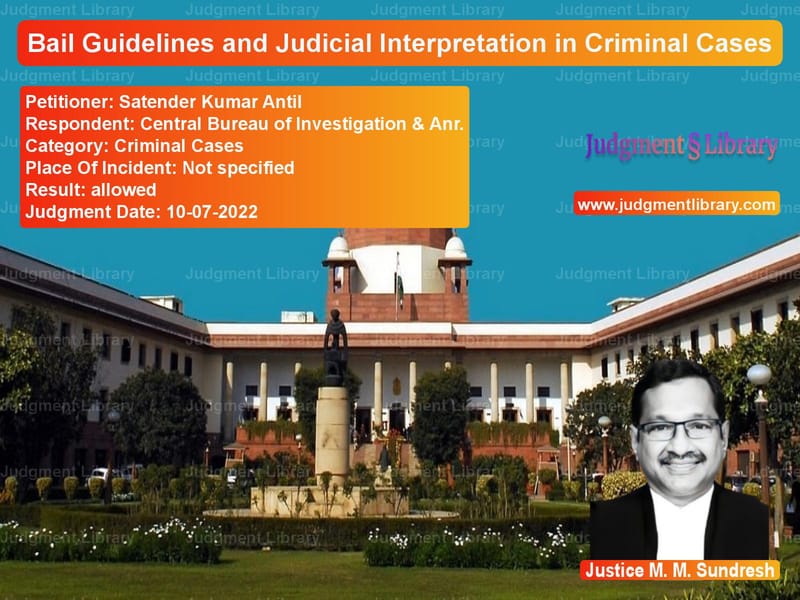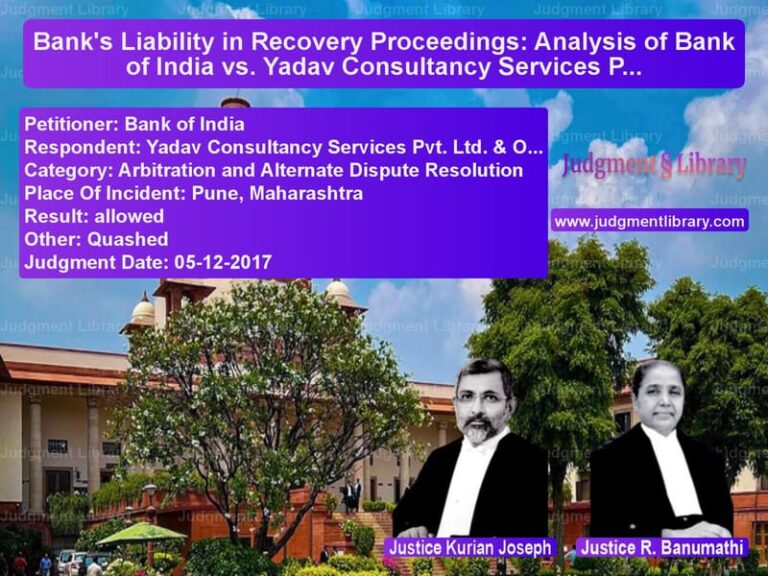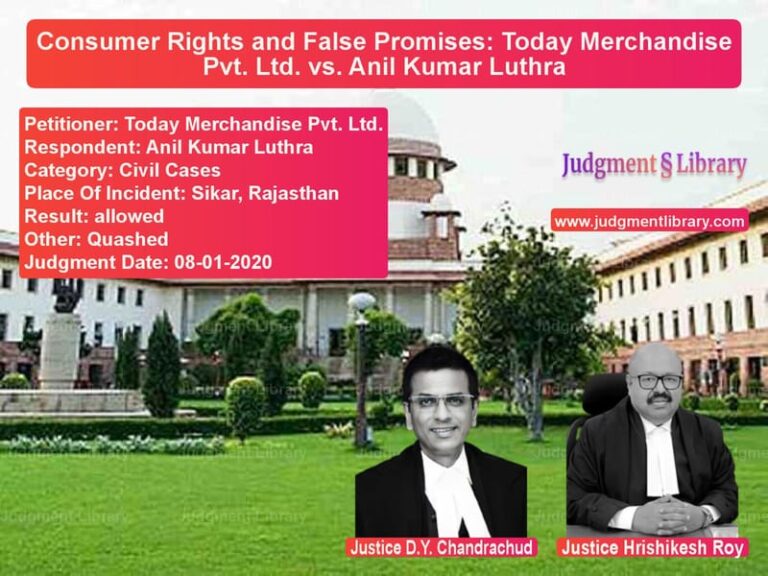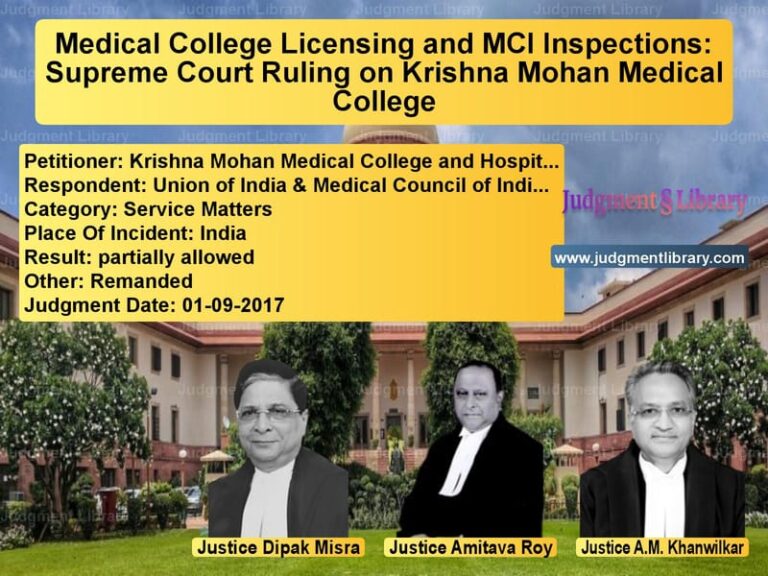Bail Guidelines and Judicial Interpretation in Criminal Cases
The present case, Satender Kumar Antil vs. Central Bureau of Investigation & Anr., raises crucial questions regarding the interpretation and application of bail provisions under the Code of Criminal Procedure (CrPC). The Supreme Court took cognizance of the rampant misinterpretation of Section 170 of the CrPC, leading to unnecessary incarceration of accused individuals. This judgment provides clarity on various categories of offenses and the applicable bail guidelines.
Background of the Case
The case primarily revolved around the frequent misuse of judicial and investigative discretion in granting bail, resulting in prolonged undertrial detentions. The appellant, Satender Kumar Antil, approached the court challenging the denial of bail despite cooperating with the investigation. The lower courts had consistently ruled against him, citing procedural grounds rather than evaluating the merit of his case.
Over the years, Indian courts have repeatedly highlighted the problem of undertrial prisoners, who often spend more time in jail than the maximum sentence prescribed for their alleged offenses. The Supreme Court noted that this case was representative of a larger systemic issue, where procedural lapses and misinterpretations of the law had led to the wrongful incarceration of many individuals.
Read also: https://judgmentlibrary.com/supreme-court-upholds-conviction-in-karnataka-terror-conspiracy-case/
Arguments of the Petitioner
The petitioner contended that despite his compliance with investigative procedures, he was repeatedly denied bail due to a misinterpretation of Section 170 of the CrPC. He argued that:
- There is no legal mandate that an accused must be taken into custody merely because a chargesheet has been filed.
- The existing bail jurisprudence emphasizes the presumption of innocence and grants bail as a general rule, except in exceptional cases.
- Unnecessary arrests violate fundamental rights under Article 21 of the Constitution of India.
- The lower courts failed to apply the principle that bail should be the rule and jail should be the exception.
Arguments of the Respondents
The respondents, including the Central Bureau of Investigation (CBI), countered that:
- Courts must consider the gravity of offenses while deciding bail applications.
- Economic offenses and serious crimes require a stricter approach to bail to ensure deterrence and prevent the accused from tampering with evidence.
- Judicial custody is necessary in cases where the accused fails to cooperate with the investigation.
- The law enforcement agencies must be given reasonable discretion in deciding when and how to take an accused into custody.
Key Observations of the Supreme Court
The Supreme Court, while examining the issue, made the following critical observations:
- Bail is the rule, jail is the exception: The court reaffirmed that bail should be granted unless there are compelling reasons to deny it.
- Misinterpretation of Section 170: The court clarified that an accused need not be taken into custody at the time of filing of the chargesheet if they have cooperated with the investigation.
- Delay in trials: The court noted that undertrial prisoners constitute a majority of jail inmates and emphasized the need for speedy trials.
- Guidelines for granting bail: The judgment categorized offenses into four types, each with specific bail considerations.
Guidelines Issued by the Court
The Supreme Court issued detailed guidelines for the grant of bail, categorizing offenses as follows:
- Category A: Offenses punishable with imprisonment of up to 7 years – Bail should generally be granted unless exceptional circumstances exist.
- Category B: Offenses punishable with imprisonment of more than 7 years, including life imprisonment – Bail applications to be decided on merit.
- Category C: Offenses under special laws such as NDPS, UAPA, and PMLA – Courts must ensure compliance with stringent bail conditions.
- Category D: Economic offenses not covered under special acts – Bail should be granted based on the severity and complexity of the case.
Legal Precedents and Comparisons
The court referred to previous landmark judgments on bail, including:
- Hussainara Khatoon v. State of Bihar: This case emphasized the right to a speedy trial and laid the foundation for bail reforms in India.
- Arnesh Kumar v. State of Bihar: The court held that arrests should not be made in a routine manner and outlined safeguards against unnecessary detentions.
- Sanjay Chandra v. CBI: The court reiterated that economic offenses, while serious, should not automatically lead to denial of bail.
Impact of the Judgment
This ruling is expected to have far-reaching consequences:
- Trial courts are now required to strictly adhere to these guidelines to prevent wrongful detentions.
- Law enforcement agencies must justify arrests beyond procedural formalities.
- The burden of proof in bail applications will now require courts to consider the proportionality of continued detention.
Conclusion
The judgment in Satender Kumar Antil vs. CBI serves as a landmark ruling that reinforces the principles of fairness and liberty in bail jurisprudence. It mandates lower courts to strictly adhere to statutory provisions while granting or denying bail. The ruling also directs all High Courts to ensure that subordinate courts comply with these guidelines to prevent unnecessary pre-trial detentions.
Petitioner Name: Satender Kumar Antil.Respondent Name: Central Bureau of Investigation & Anr..Judgment By: Justice M. M. Sundresh.Place Of Incident: Not specified.Judgment Date: 10-07-2022.
Don’t miss out on the full details! Download the complete judgment in PDF format below and gain valuable insights instantly!
Download Judgment: satender-kumar-antil-vs-central-bureau-of-in-supreme-court-of-india-judgment-dated-10-07-2022.pdf
Directly Download Judgment: Directly download this Judgment
See all petitions in Bail and Anticipatory Bail
See all petitions in Custodial Deaths and Police Misconduct
See all petitions in Judgment by M.M. Sundresh
See all petitions in allowed
See all petitions in supreme court of India judgments July 2022
See all petitions in 2022 judgments
See all posts in Criminal Cases Category
See all allowed petitions in Criminal Cases Category
See all Dismissed petitions in Criminal Cases Category
See all partially allowed petitions in Criminal Cases Category







